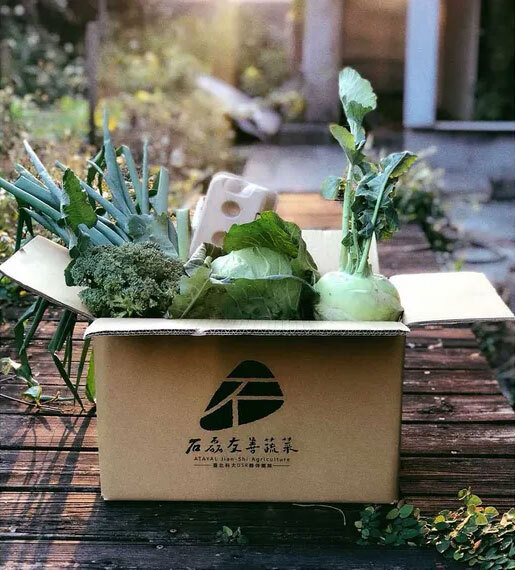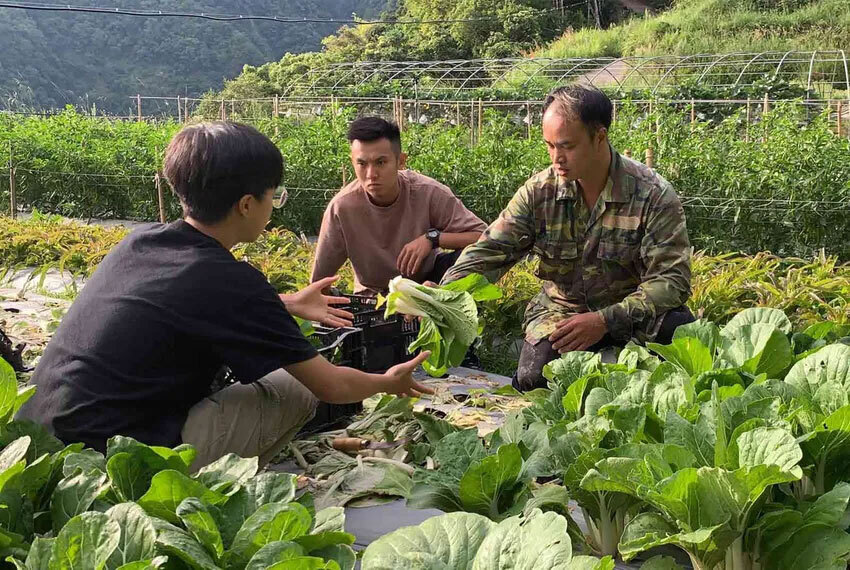USR: Using technology to build a “cold cellar” with a natural refrigerator, NTUT creates “uninterrupted chain” agriculture for Shilei(石磊) tribe.

Since 2018, NTUT has been promoting the "Indigenous Tribe Sustainable Living and Green Economy Promotion Plan" as part of their USR activities.
Image source: Provided by NTUT
The Shilei Tribe in Jianshi Township, Hsinchu, grows healthy vegetables using natural farming methods, but they find it difficult to sell them. NTUT's USR team went up the mountain and used technology to optimize the Atayal tribe's traditional natural refrigerator, the "cold cellar." They also helped to promote markets and group purchase channels to create an unbroken chain from production to sales.
The Yulao Scenic Platform, at an altitude of 1,450 meters, is a famous spot on the way to Jianshi Township, Hsinchu. In the scorching heat of August, NTUT students and local youth from the nearby Shilei Tribe were building a semi-open pavilion to provide local farmers with a sheltered "direct sales store."
"In the future, the tribe will be able to sell fruits and vegetables here regularly," said NTUT College of Design Dean and Architecture Professor Huang Chih-Hong, who led the students.
This is one of the activities under the "Indigenous Tribe Sustainable Living and Green Economy Promotion Plan" launched by NTUT in 2018. They collaborated with the Commercial Design Department of Chung Yuan Christian University to improve the physical environment of this Atayal tribe. Besides the direct sales store, they provided design plans to help rebuild the prayer space on the Sacred Prayer Mountain. They also assisted in designing the brand "Shilei Friendly Vegetables," set up a Facebook fan page, and filmed videos for marketing, aiming to make the tribe "live comfortably and work happily."

NTUT collaborated with the Commercial Design Department of Chung Yuan Christian University to create the brand "Shilei Friendly Vegetables" for the agricultural products of the Atayal(泰雅) tribe.
Image source: Provided by NTUT
"They use natural materials like Amur cork tree and Japanese yew to make nutrient solutions to promote natural farming. Our vision is to make Shilei the Shangri-La of Austronesian languages," said Huang Chih-Hong.
First, a Thriving Livelihood, Then a Comfortable Home
How is NTUT, located in the affluent area of Taipei, connected to the indigenous tribes in the rural areas of Hsinchu?
NTUT is actually a major center for research on Taiwanese indigenous architecture. Founded in 1912 during the Japanese colonial period, one of NTUT's former principals was Jutarō Chichiyasu, a mountain-loving architect who documented traditional indigenous buildings across Taiwan. His family later donated his precious manuscripts and old photographs to NTUT, which Huang Chih-Hong organized into the "Complete Collection of Survey and Mapping Manuscripts of Taiwanese Indigenous Dwellings."
"A few years ago, his son came to NTUT to commemorate his father. I thought he needed help, so I approached him, only to find out his father was a former principal. This unexpected encounter led to our later collaboration," said Huang, explaining the serendipitous origin of the partnership.
With these documents, Huang Chih-Hong began helping indigenous communities restore their traditional ancestral homes. Coincidentally, Associate Professor Huang Yiting of Chung Yuan's Commercial Design Department was familiar with the Shilei Tribe, leading to their collaboration on the USR project, choosing Shilei as the implementation site. Initially, Huang Chih-Hong proposed blueprints for renovating tribal houses with modern yet nature-integrated designs, which greatly interested the tribe. However, the cost of renovating a house is at least 3 to 4 million NTD, which the farmers could not afford. This made them realize that before achieving a "comfortable home," they needed to ensure a "thriving livelihood."

Farmers working in the tribe's high mountain farms.
Image source: Provided by NTUT
Unbroken "Cold Chain"
They utilized their architectural expertise to first renovate the stalls near the Yulao Scenic Platform and created a modern cold cellar for the tribe. Traditionally, the tribe would dig a pit to channel cold mountain spring water, placing agricultural products on racks above it, like a natural refrigerator. NTUT's Department of Energy and Refrigeration and Air Conditioning Engineering, along with the Department of Civil Engineering, assisted in using technology to improve this setup. They built the cold cellar with cement and installed sensors to monitor the temperature. They also coordinated with companies to rent used refrigerated trucks at low cost, establishing a complete "cold chain" to keep agricultural products fresh from production to sale.
While building the infrastructure was manageable, expanding marketing channels proved challenging. Small farmers have low production volumes, making it difficult to enter large markets, and forming a cooperative is also challenging. Currently, they have started by organizing markets at Yulao, NTUT, and Chung Yuan campuses, and are assisting with group purchases at institutions like the Ministry of Education, Academia Sinica, and the Industrial Technology Research Institute, hoping to establish a distribution chain between the tribe and urban areas.

The team organized the "Cloud and Mist Market" to help promote the sale of local agricultural products.
Image source: Provided by NTUT
"We also want to help establish channels to vegetarian restaurants, creating a sales group with a certain economic scale, which will eventually need to be managed by the tribe itself," said Huang Chih-Hong.
The Most Difficult Part is Working with the Tribe
They spent 7 to 8 months, with teachers leading students in field surveys, building relationships, and understanding the needs. "During this process, students had their first encounters with clients, which I call the most beautiful encounter between professionalism and practice. The elders treated the students like their own grandchildren, providing four meals a day. The students also realized that their expertise could help others, which is a professional learning experience in altruistic service," Huang Chih-Hong provided the best explanation for USR.

Students are helping residents renovate their stalls.
Image source: Provided by NTUT

Completed stall renovation
Image source: Provided by NTUT



